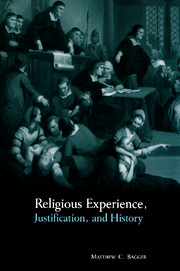Book contents
- Frontmatter
- Contents
- Acknowledgments
- List of abbreviations
- Chapter 1 Introduction: spectral evidences
- Chapter 2 The explanation in experience and the explanation of experience
- Chapter 3 Justification by reasons alone
- Chapter 4 Perennialism revisited
- Chapter 5 The miracle of minimal foundationalism
- Chapter 6 Loves noble Historie: Teresa of Avila's mystical theology
- Chapter 7 Modernity and its discontents
- Bibliography
- Index
Chapter 5 - The miracle of minimal foundationalism
Published online by Cambridge University Press: 22 September 2009
- Frontmatter
- Contents
- Acknowledgments
- List of abbreviations
- Chapter 1 Introduction: spectral evidences
- Chapter 2 The explanation in experience and the explanation of experience
- Chapter 3 Justification by reasons alone
- Chapter 4 Perennialism revisited
- Chapter 5 The miracle of minimal foundationalism
- Chapter 6 Loves noble Historie: Teresa of Avila's mystical theology
- Chapter 7 Modernity and its discontents
- Bibliography
- Index
Summary
Once we accept anyone's postulates he becomes our professor and our god: for his foundations he will grab territory so ample and so easy that, if he so wishes, he will drag us up to the clouds.
Montaigne (1580)Whereas the balance of this book argues for my preferred view of experience and justification, in this chapter I will survey and evaluate the line of thought which motivates the topic. During the last fifteen years, some philosophers have again enlisted religious experience to justify theism. Two parallel, and until quite recently, largely discrete discussions have appeared in the literature. One exchange centers on Richard Swinburne's discussion of the topic in The Existence of God. Both Caroline Franks Davis, a student of Swinburne's at Oxford, and Jerome Gellman have since given Swinburne's approach a fuller and more extensive treatment in book-length studies. The other debate stems from the work of Alvin Plantinga and the Reformed Epistemologists. Whereas Reformed Epistemology generally points to experience as proper justification, William Alston in a series of articles, and, recently, a full-length monograph has most explicitly given religious experience consideration as a source of justification for theism.
Initially the uses to which these two camps put religious experience substantially differed. On the one hand, Swinburne, Franks Davis, and Gellman seek evidence with which to bolster an argument for the existence of God.
- Type
- Chapter
- Information
- Religious Experience, Justification, and History , pp. 109 - 134Publisher: Cambridge University PressPrint publication year: 1999

